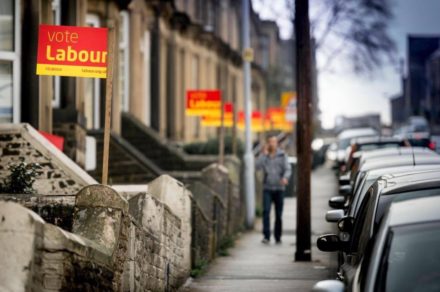
As Sadiq Khan said in his acceptance speech in the early hours of Saturday morning, voters in London chose “hope over fear” by voting for a Labour mayor and for the capital’s first Muslim mayor. But his triumph also provides a glimmer of hope amid a deeply depressing set of election results for Labour.
It’s the first time that an Opposition has failed to increase the number of councillors for over 30 years (that was in 1985 – we’d just lost two general elections and Labour went on to lose two more). This was also the first time in modern history that any leader of the Opposition has lost seats in their first year. No leader of the Opposition has gone on to win a general election without winning seats in local elections in their first year. Average council gains for a party of opposition in non-general election years are 434. And if you’re an Opposition leader destined to win a future general election, it’s 526.
Last Thursday, Labour suffered losses in the local elections in England. We went backwards in Wales and we saw an electoral catastrophe in Scotland as we were beaten into third place by the Tories. Jeremy Corbyn celebrated by saying we’d “hung on”, but in crucial bellweather seats like Nuneaton where we did hold onto the council Labour suffered an 11 per cent swing to the Tories.
And let’s not forget the context. The Conservatives are undoubtedly in a worse state than at any point since the years of John Major and ‘Tory sleaze’ in the mid-nineties. Rising jobless figures, a junior doctor’s strike, a crisis in the steel industry, a Cabinet resignation, bitter splits over Europe and a series of shambolic U-turns over tax credits, disability payments, child refugees and academies.
Facing the political equivalent of an open goal, Labour should have scored a hatful of goals and won hundreds of seats, putting us on a clear trajectory to win the 2020 general election.
But thankfully it was a very different story in London. Sadiq Khan fought an energetic, principled and dignified campaign that secured him a huge victory. He took on a nasty, divisive and well-funded Tory election machine and a largely hostile right-wing media and won handsomely.
He did this by showing that Labour was in touch with Londoners by focusing on the issues that matter to them like housing and transport. He knew that it wasn’t enough for Labour just to mobilise its base. That’s why he reached out to people who were not natural Labour supporters with a positive, popular and inclusive campaign that resonated with Londoners and, crucially, chimed with their sense of aspiration.
And Sadiq knew the fundamental importance the voters attach to leadership. He was able to articulate his vision to Londoners based on his own personal story of the bus driver’s son who’d done well in the face of adversity. He also demonstrated strong leadership. When it came to the row over anti-Semitism, Sadiq dealt with the issue swiftly and decisively by condemning offenders unequivocally and calling for action.
Like the more resilient and successful candidates in last week’s elections, additionally he moved to mitigate against – how can I put it? – less popular elements of the Labour Party nationally by running on key local issues like his fares freeze (as opposed to banging on about Trident or the Falkland Islands).
This is an emerging truth from other places where Labour did well. So many successful local campaigns threw overboard the dead weight of the national party and ran ultra-local campaigns that tried to command broad based appeal – like the one Ben Bradshaw has talked about that saw the biggest ever majority in the Exeter city council elections.
Sadiq’s success in London, firmly rooted in the centre ground, is in stark contrast to Labour’s approach in Scotland. Jeremy Corbyn was convinced that his anti-austerity, left wing, anti-Trident ticket was the key to transforming Labour’s fortunes North of the border. We tried to outflank the Scottish Nationalists from the left, but our policies were rejected overwhelmingly in what turned out to be a hideous disaster.
Labour’s shadow Scottish Secretary Ian Murray, who knows a thing or two about winning a difficult fight after holding a marginal seat in the face of last year’s parliamentary wipe-out in Scotland, summed it up by saying that the public simply didn’t view Jeremy Corbyn’s Labour as “a credible party of future government”.
As a South Yorkshire MP, I often complain about the disproportionate amount of attention that London gets. But there are huge lessons for Labour to learn from Sadiq’s victory in London.
If Labour is to win back the millions of votes we need, we need to stop talking to ourselves and preaching to the converted – and we need to reach out beyond our core vote and our comfort zone. We need to dump the obsession with fringe issues by showing that we understand and share the concerns and aspirations of ordinary voters.
Understandably Jeremy likes to talk about the mandate he received from 250,000 party supporters. But fundamentally it was a mandate to win power. Just because someone passes their test and is given a driving licence, it doesn’t entitle them to drive the car into the nearest brick wall.
Sadiq Khan has just won a historic mandate from the public, not just from the party faithful, of more than 1.3 million votes. Labour has an opportunity to show that his victory in London was not something that bucked the trend, but something that started a trend. If we do that, there will indeed be hope.
Michael Dugher is Labour MP for Barnsley East and a former member of the shadow cabinet




More from LabourList
‘As metro mayors gain power, Labour must tighten political accountability’
Letters to the Editor – week ending 22 February 2026
‘The coastal towns where young people have been left behind by Whitehall’